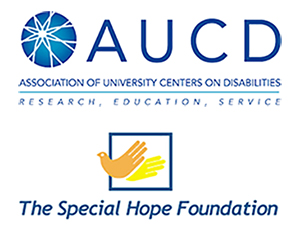Three UCEDDs Receive Nearly $150,000 in Grants from the Special Hope Foundation
January 27, 2017

|
The Special Hope Foundation is pleased to announce that three University Centers for Excellence in Developmental Disabilities (UCEDD) were selected for funding of their training projects. The grants will support a variety of programs providing training for healthcare providers, interpreters and other health professionals in integrating a culturally responsive framework in healthcare services for adults with intellectual and developmental disabilities. All projects include Self-Advocates as leaders, trainers and in oversight roles. The applications were carefully reviewed and considered by the Foundation's Board and staff as well as the Special Hope Foundation's Self-Advocate Advisory Committee and medical providers at the American Academy of Developmental Medicine and Dentistry (AADMD), with whom the Special Hope Foundation partners in all Request for Proposals (RFP) funding cycles.
"Healthcare access is a challenge for anyone with an intellectual or developmental disability, and that challenge can be more profound if the person and their family face bias or do not understand what is being discussed due to language, culture, sexual orientation or immigration status" said Lynne O'Hara, Executive Director of the Foundation. "With this Request for Proposals, we hoped to support, expand and facilitate dissemination of the excellent work being done on this issue. Additionally, we hoped to pique the interest of other organizations that may not have thought about these barriers to learn from their peers. The Foundation is very proud that each of the projects we awarded include Self-Advocates as partners at every level."
Following are the projects funded and the purposes of each grant:
Partnership for People with Disabilities - Virginia Commonwealth University:
The Partnership for People with Disabilities, Virginia's University Center of Excellence in Developmental Disabilities, aims to improve access to positive healthcare outcomes for people with Intellectual and Developmental Disabilities (I/DD) by developing, piloting and refining a curriculum, Multicultural Agility in Healthcare for the I/DD Population. A 10 member multidisciplinary steering committee to include people with I/DD, Leadership Education in Neurodevelopmental Disabilities trainees, parents of youth with I/DD and healthcare professionals will review existing cultural competency training across the medical/dental field and design a pilot delivered by diverse people with I/DD.
University of Alaska Center for Human Development:
The goal of this project is to reduce health disparities for intersectionally diverse Alaskans with IDD, through training a more disability positive and culturally competent healthcare workforce. Co-trainers with and without intellectual/developmental disabilities will be recruited to tailor and deliver trainings to current and future healthcare providers.
University of Rochester:
Communication is central to effective health care. Clear and thorough language interpretation facilitates care of individuals from traditionally under-served minorities, but the special communication elements required to serve people with Intellectual and Developmental Disabilities (IDD) are not part of interpreter training, nor are cultural differences in perception of developmental disabilities. This project will train Spanish language medical interpreters in these missing elements.
# # #
The mission of the Special Hope Foundation is to promote the establishment of comprehensive health care for adults with developmental disabilities designed to address their unique and fundamental needs.







